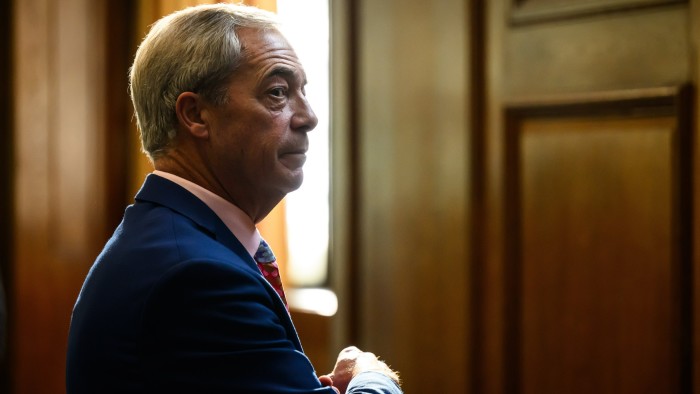Unlock the Editor’s Digest for free
Roula Khalaf, Editor of the FT, selects her favourite stories in this weekly newsletter.
Nigel Farage will shelve an earlier Reform UK pledge to deliver massive tax cuts in order to prioritise bringing down public spending, as his poll-leading party looks to boost its credibility on the economy.
The Reform leader is expected to signal a shift in fiscal policy in a speech in the City of London on Monday as the party sets out its “economic vision”, dropping plans for sweeping tax cuts until the party restores confidence in the public finances.
The move marks a departure from its previous election pledge to reduce taxes by £90bn, and comes after Farage in October promised that Reform UK would “never borrow to spend” if it came to power.
The party has since been forced to abandon its £90bn tax-cutting pledge, describing it as an “aspiration”.
Farage will promise on Monday that Reform will control public spending and reduce the nation’s borrowing costs. “Then, and only then, will I cut taxes to stimulate growth. We must get the economy growing,” he will say.
Reform UK has previously pledged sweeping tax cuts — including lifting the income tax personal allowance to £20,000, reducing corporation tax to 15 per cent and abolishing inheritance tax on estates worth less than £2mn — arguing that lower taxes would boost growth and reward work.
But economists, including at the Institute for Fiscal Studies, have warned that the numbers do not add up, estimating that the plans would cost tens of billions of pounds more than the party claimed.
Shadow chancellor Mel Stride said the party was making a “desperate attempt” to appear economically credible.
“It’s impossible to take Reform seriously on the economy when their promises disintegrate after five minutes . . . they are a one-man band and have resorted to junking promises,” he said.
The Labour party said: “Nigel Farage says he is offering something new, but for all his talk, his plan would take us back to austerity.”
Reform has yet to set out any detailed plans on spending cuts, although it has signalled there will be big reductions in spending on net zero policies, welfare benefits, asylum support for migrants, foreign aid and the civil service.
Instead, the Reform leader will argue that both the Tories and Labour have “wrecked the public finances”, and that his party “will restore them. In doing so, we can stop this doom-loop of raising taxes on people every year”.
He will also look to position Reform as a pro-business party, and point to digital assets such as cryptocurrencies as a route to growth.
“We will reduce the size of the bloated state. We will bring expertise into government. We will reduce regulation and the power of the regulators . . . But I know we can only cut taxes once the deficit is under control,” he will say.

